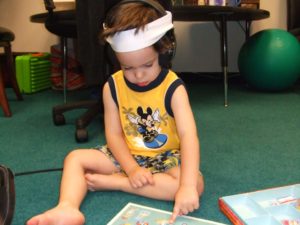Blog
Effective Listening Impacts Self Calming and Social Skills
Peter’s Story

Mom’s Report after Ten Days of Intensive Listening Therapy
Peter was a three-year-old whose mom was exhausted and frazzled by his constant jumping and banging into her. Peter had auditory processing difficulties resulting in poor night’s sleep, days filled with crying, whining aggressive behavior toward siblings and peers, difficulty playing or relating appropriately with toys, and difficulty exhibiting empathy toward those closest to him when they were hurt. His language was precocious, but his self-control and relationship skills were immature.
Her testimony says it all. “What a change two weeks of bone conduction have brought. Peter is happy and smiling. He cooperates, compromises, transitions well and obeys. No longer does he throw toys. He now plays appropriately with them. No longer does he hit his siblings and laugh; he now gives hugs and kisses. Before therapy, he shot around the house like a ball in a pinball machine. Now, he has purpose and direction. He plays, interacts, and converses in an orderly and appropriate manner. His favorite phrase is “Can I help you, Mommy?” and he does do what I suggest. I would never have let the “old Peter” set the dinner table. We would have had water on the floor and forks stuck in the wall. Now, this is fun Mommy/ Peter time. He takes direction and seeks to please rather than taking delight in wreaking havoc. In addition to his beautiful daytime behavior, his sleeping has improved 100%. He goes to sleep without crying, stays asleep and wakes up happy”.
Effective Listening Impact on Self Regulation
Auditory processing is foundational to success and ease in so many areas of life. People who have mild to moderate difficulty understanding in challenging environments become inordinately tired, working hard to make sense of their world. Highly intelligent individuals with moderately severe to profound issues in auditory processing are inexplicably challenged in noisy environments. They are prone to depression, anxiety, and irritability in addition to having difficulty following multiple step directions and not completing work they easily can do in a quiet environment. They may avoid noisy environments unless they are creating the noise. They frequently are very controlling and manipulating to keep their environment as comfortable as possible. While ineffective listening may impair language development, it sometimes simply creates stress so the person, like Peter, is determined to be in control and have wild mood swings.
Effective Listening Problem/ Not a Parenting Problem
Peter’s mom was an experienced and skillful mother of four. In spite of using her best parenting skills, she had a child she couldn’t control and sadly couldn’t enjoy. As he entered his toddler years he became increasingly unhappy. He approached toys not as playthings but as objects to break, stomp on or throw. He became aggressive toward his siblings, then his friends at school. To sum it up in mom’s words, “much more was going wrong than right.”
Her conclusion following using The Listening Program with bone conduction equipment for two consecutive weeks was, “The end result of all this change is we are all enjoying Peter so much. We look forward to spending time with him instead of away from him. He is the fun, loving engaging child that we just knew he could be.” https://www.ctsdallas.com/resources/resources-for-parents/using-a-sensory-diet-to-improve-self-regulation/
